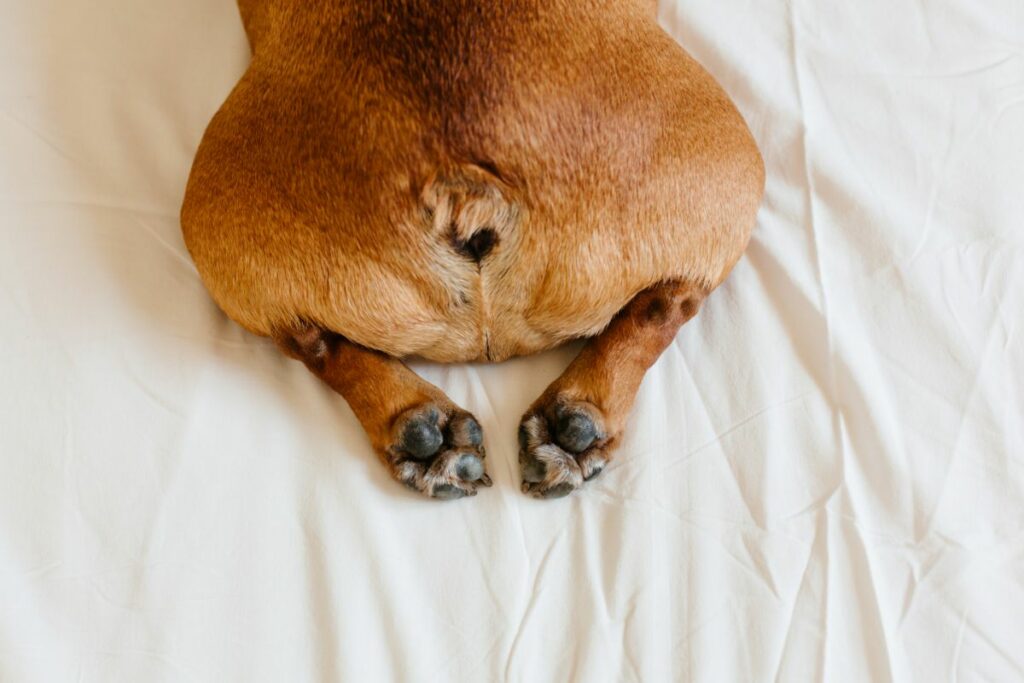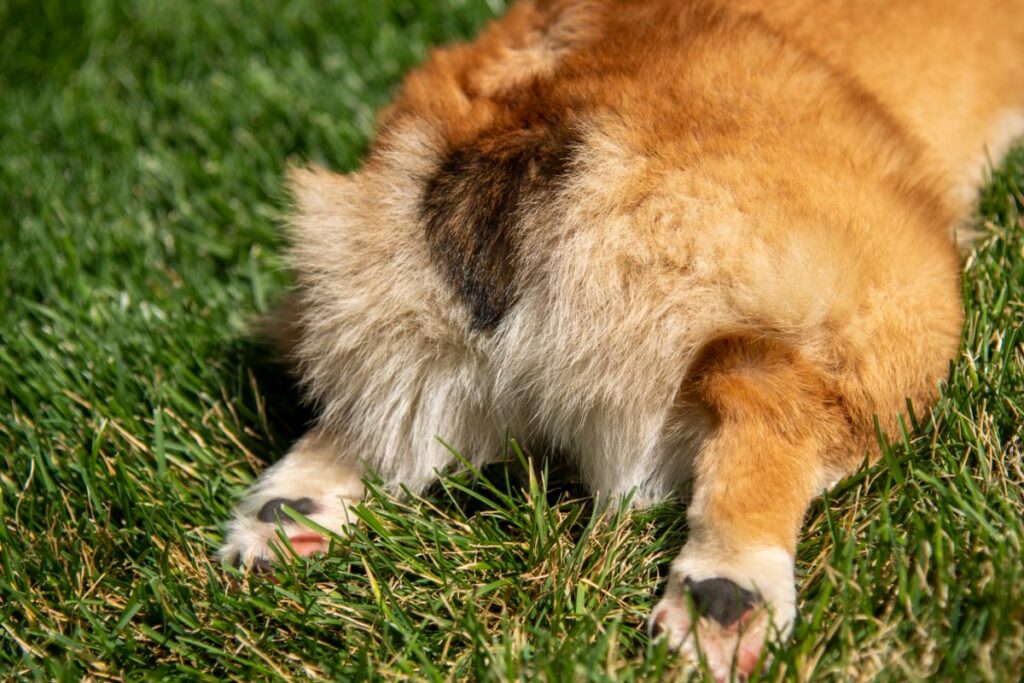Hey there, fellow pet parents! Have you ever caught your dog in the act of relentlessly scratching their rear end?
We’ve all been there, wondering why they can’t give it a rest. Well, worry not – you’re not alone in this predicament.
In this article, we’ll look into the common reasons behind your dog’s persistent bum-scratching habits and, more importantly, how to put an end to the itch-fest.

From potential health issues to behavioral quirks, we’ll unravel the mystery behind their constant attention to that backside.
Our goal is to equip you with practical insights and handy tips that’ll have your pup feeling more comfortable and less fixated on their posterior pursuits.
So, grab a seat, and let’s tackle this itchy situation together.
Common Causes
Let’s begin by taking a look at the common culprits that cause your dog to become obsessed with his butt.
First up, allergies – just like us, dogs can be allergic to certain foods, environmental factors, or even flea bites in uncomfortable places.
Speaking of fleas, those tiny troublemakers are next on our list. These pesky critters not only irritate but can lead to dermatitis.
Skin infections are also a potential bother, often accompanied by redness and discomfort.
If they’re specifically scratching at their rectum, another possibility could be worms, an intestinal parasite that often causes a lot of itchiness – these are also the common cause for dogs dragging their bums on the floor.
Health Check
Ensuring your dog’s well-being starts with a thorough health check. Picture it as a routine checkup with a focus on their backside antics.
When you bring your furry friend to the vet, they might conduct a detailed physical examination, looking at the skin, fur, and overall condition. This hands-on approach allows them to detect any abnormalities or signs of discomfort.
Additionally, your vet might suggest diagnostic tests like skin scrapings, blood work, or allergy testing to pinpoint the root cause.
They want to get to the bottom of the issue – literally. Remember, a proactive vert visit can nip potential health concerns in the bud.
Grooming Tips
Next, let’s delve into some grooming tips to keep your canine companion feeling fresh and itch-free.
Regular baths are a game-changer, using a mild, vet-approved shampoo to cleanse their coat without stripping essential oils.
Pay extra attention to the tail base and hindquarters, where irritation often occurs. Brushing not only keeps their fur tangle-free but also stimulates the skin and promotes healthy circulation.
Opt for a soft-bristle brush to avoid any discomfort. And don’t forget those adorable ears – clean them gently to prevent infections.
By incorporating these grooming habits into your routine, you’re not just pampering your pup; you’re actively contributing to their overall well-being.
Parasite Prevention
Ensuring your pup’s comfort involves staying a step ahead of pesky parasites. Fleas and ticks are not just irritants; they can lead to serious health issues. Lucky for us, effective preventive measures abound!
Regularly check your dog for these hitchhikers, especially after outdoor escapades. Consult your vet for advice on spot-on treatments, oral medications, or collars tailored to your furry friend’s needs.
These preventative steps can create a shield against potential discomfort, keeping your dog’s tail wagging happily.
Remember, just like the vets, being proactive and repelling these intruders is much easier than trying to evict them!

Diet And Nutrition
When it comes to banishing the behind itch, your dog’s diet plays an important role. A balanced, nutrient-rich menu not only fuels their overall health but also ensures a gleaming coat and itch-free skin.
Opt for high-quality food, prioritizing formulations rich in omega-3 fatty acids and antioxidants. These power-packed elements promote skin elasticity and combat inflammation.
Consider incorporating fish oil supplements or introducing foods like salmon and sweet potatoes into their meals.
A nourishing diet isn’t just about filling their bowls – it’s about cultivating a glow from the inside out, leaving your pups behind happily itch-free.
Environmental Considerations
It’s important to consider your pup’s surroundings. Weather, humidity, and allergens can play a significant role in your dog’s skin health.
Hot, dry weather might lead to dry skin, while excessive humidity can foster fungal infections. Allergens like pollen or certain grasses may also trigger itching.
Pay attention to seasonal changes and adapt your care routine accordingly. Regular grooming, especially after outdoor play, helps remove potential irritants.
Consider a humidifier to maintain indoor moisture levels. If your furry friend seems more irritated during specific seasons, it could be an environmental factor.
Being mindful of these elements adds another layer to your approach to ensuring your dog’s comfort.
Final Thoughts
In wrapping up, remember that your dog’s incessant bum-scratching is a puzzle with solvable pieces.
By understanding the potential causes, prioritizing regular vet check-ups, and implementing practical tips like grooming and a balanced diet, you’re well on your way to banishing the itch.
Each pup is unique, so consulting with your vet ensures a tailored approach for your furry friend. With a bit of patience, care, and expert guidance, those scratching days will become a distant memory.
Happy tails and happy trails!
FAQ
How long does it take to see improvement in my dog’s bum-scratching behavior?
Improvement varies based on the underlying cause. Consistency is key in following your vet’s recommendations for treatment, grooming, and preventive measures. Be patient and monitor your dog’s progress.
Are there home remedies to soothe my dog’s itchy bum?
Yes, vet-approved remedies include soothing baths with oatmeal or chamomile and hypoallergenic wipes. Always consult your vet before trying any home treatments.
How do I address behavioral factors contributing to bum-scratching?
Identify and address stress, boredom, or anxiety through engaging activities, interactive toys, and positive reinforcement training. A happy, stimulated pup is less likely to scratch obsessively.
- Help! My Dog Won’t Leave His Bum Alone! - November 21, 2023
- Grooming Guide: How To Groom A German Shepherd - November 20, 2023
- Your Guide To Training For Australian Shepherds - November 17, 2023










